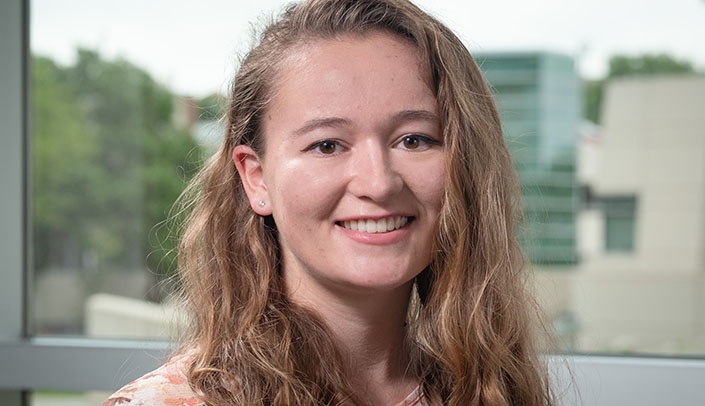On May 28, the Nebraska Institutional Development Award Program (IDeA) Networks of Biomedical Research Excellence (INBRE) program welcomed 29 undergraduate students from across Nebraska as they embark on their summer research experience at Creighton University, the University of Nebraska-Lincoln and UNMC.
Below Rebekah Rapoza, a biology major at Creighton University, talks about her INBRE experience.
What should we know about you?
“Although I have many passions, genetics has particularly fascinated me ever since I first encountered Punnett squares and the basis of genetic recombination in my high school biology textbook. Even then, I knew I was exploring science that will engage me for life. The variations, statistics, data, and analysis genetics requisites pique my interest. I enjoy deciphering the basis of recombinant chromosomes and mutations and debating the ethics and perils of cloning and comparing the double standards of eugenics in equines versus humans. I had always been homeschooled until attending college and this instilled in me a sincere love of learning, a quality which has only been deepened through my Creighton experience. I not only need to understand the “how” but also the “why.” I approach problems with excitement — eager to analyze, puzzle, test, and grow in the process and I am confident the INBRE program will equip me with the foundation to excel.”
What or who influenced your interest in science?
“While I have been slightly obsessed with genetics since Chapter 12 of my high school biology textbook, in my junior year of high school, I had the great honor of meeting with Lois Starr, M.D., a pediatric geneticist at Omaha’s Children’s Hospital & Medical Center (and the medical director of the UNMC Munroe-Meyer Institute) and quickly realized my deep attraction to the field.”
What is it about science that excites you?
“Science offers a distinctive dimension to our reality that continues to excite and amaze me. As someone who doesn’t tend to be satisfied by surface answers, I have always appreciated how science encourages a deeper level of analysis and thought. It demands not only radical thinking and complex problem solving but also intensive strategy and incredible ingenuity. It’s a puzzle sans the guiding picture on the front cover of the box with several pieces missing and several extraneous ones added. Only by perseverance, cooperation, systematic failure and re-evaluation, and a fair bit of luck can you ever complete part of it. That’s what truly fascinates me.”
Will you pursue a career in science? If so, what do you hope to accomplish?
“Pediatric genetics combines both my love of helping children with my love for genetics in a dynamic that I know will continue to challenge and engage me. I have been pursuing this goal since high school and believe that a strong background in research will help prepare me for the academic and intellectual rigors I will face as a professional. As such, I hope to be considered as an M.D.-Ph.D. candidate and further explore the underlying biochemical basis of processes and their application to biological contexts.”
Why is it important to have programs like INBRE?
“Being challenged, and challenging others, to stretch the mind and to engage in a deeper level of learning and commitment — this is why programs like INBRE are so rewarding.”

What an impressive and intelligent young woman. Such a positive example of STEM potential especially for woman as well as the limitlessness of home schooling when done well. Renews one's optimism for the upcoming generation. p.s. It's also wonderful to see Creighton & University of Nebraska collaborating rather than competing.